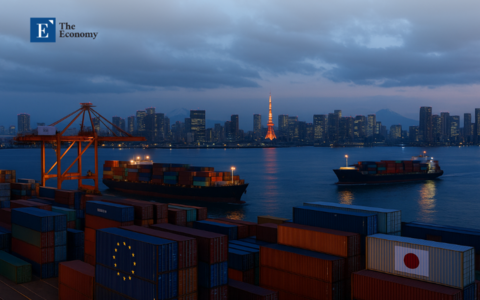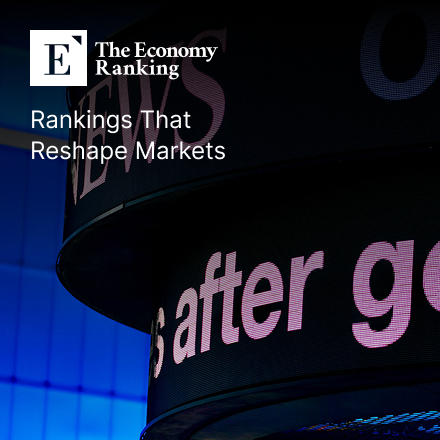Input
Changed
This article was independently developed by The Economy editorial team and draws on original analysis published by East Asia Forum. The content has been substantially rewritten, expanded, and reframed for broader context and relevance. All views expressed are solely those of the author and do not represent the official position of East Asia Forum or its contributors.
A ship cannot answer every distress flare, least of all those flickering beyond its natural patrol zone. Europe, long accustomed to following Washington's wake, has run aground on the unyielding shoal of complex arithmetic. In the vast Pacific, that reality translates into a humbling truth: the continent has neither the resources nor the strategic stake to square off against China, and any attempt to do so would squander scarce political capital better spent on troubles pressing in at home. This strategic misalignment is a theoretical and pressing issue with far-reaching implications.
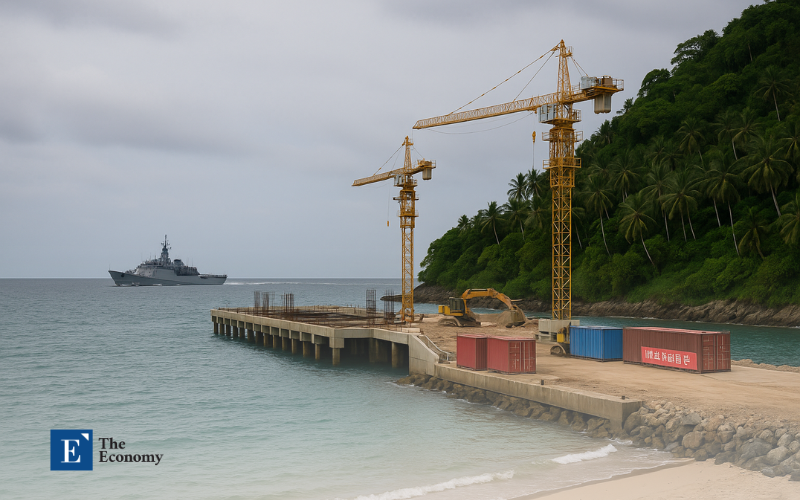
The Vanishing Strategic Surplus
Little more than a decade ago, Brussels could indulge the illusion that its development purse was bottomless. Europhile planners spoke of a marge d'action extérieure, a discretionary bankroll that painted classrooms in Funafuti one quarter and funded judicial reform in the Sahel the next. That cushion collapsed the day Russia's tanks drove energy prices through the roof and forced every European treasury to divert windfall revenue toward artillery lines, LNG terminals, and refugee reception centers. Defense outlays that hovered near 1.2% of EU GDP in 2020 are on course to clear 1.6% by 2026—a rise that drains roughly €16 billion from civilian programs for every tenth of a percentage point added. In raw numbers, once booked for micro-grids in Kiribati or teacher training in Vanuatu, that money now buys 155 mm shells in Slovakia and Patriot interceptors in Poland. Pacific chancelleries read the budget annexes as clearly as anyone: what Brussels can still spare after plugging holes in its neighborhood is barely the loose change rattling in parliamentary coat pockets.
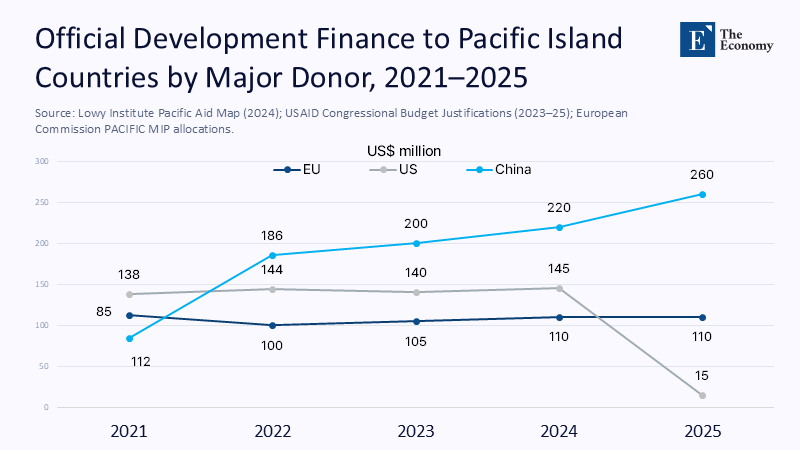
Trump'sTrump's Budget Axe and the Chequebook Vacuum
Donald Trump'sTrump's return to the White House did more than shift rhetoric; it erased an entire column of grant finance. The new National Security Memorandum 3 froze ninety % of USAID cooperative agreements worldwide. Already on life support, Pacific governments lost overnight the single donor willing to fund primary school textbooks and potable-water trenches in the same five-year plan. Kiribati's 2025 public works budget shed a quarter of its external revenue; Samoa postponed a digital learning roll-out for want of seed laptops. In spotting an opportunity, Beijing dispatched an envoy to Suva within two weeks, dangling US$ $135 million to rebuild Vanua Levu's ring road and another US$ $20 million in soft budget support for the Solomon Islands. The speed of the offer was theatrical, but the message was plain: Chinese money would backfill every vacuum Washington leaves, and local ministers would not even need to file time-sheet audits. This shift in power dynamics is not just a trend, but a seismic change with significant implications for the Pacific.
European officials watched from Brussels with a sigh. A continent now underwriting two proxy wars—one kinetic in Ukraine, the other economic with Russian gas—cannot chase Beijing's concrete mixers halfway across the planet. For Pacific politicians, the optics are decisive: Europe preaches resilience, and China pours asphalt.
Aid Arithmetic—Beijing's Concrete Versus Brussels' Caution
The ledger tells the story better than a diplomatic note ever could. China's disbursements to the Pacific rocketed from roughly US $85 million in 2021 to about US $260 million in 2025. European flows hover at a flat US $100–110 million annually. Once the region's bedrock, American commitments are projected to plunge below US $15 million—the price of resurfacing a single German autobahn junction—before the fiscal year closes. On a per-capita basis, Europe now spends roughly €110 per Pacific Islander over a four-year cycle; China spends about €730. Money is not everything, but symbolism counts, and no finance minister in Suva, Apia, or Port Vila can fail to see which partner writes bigger cheques with fewer caveats.
Why the Pacific Is Not Europe's Indo-Pacific Prize
Proponents of an EU "Indo-Pacific strategy" routinely fuse two vastly different theatres: the teeming markets of South and South-East Asia and the micro-economies of the South Pacific. The conflation is convenient for conference panels but absurd at the border bureau counter. The Pacific EPA group's entire merchandise trade with the EU clocks in just above €4 billion—about 0.15% of extra-EU trade. Fiji and Papua New Guinea combined import fewer European goods than Luxembourg. World Bank tables peg average Pacific GDP growth at 3.6% in 2024, half the Asian mean; Fiji, the supposed regional heavyweight, lingers below two. European export-credit agencies, already stretched to ensure turbines in India and metro cars in Vietnam, find zero commercial logic in subsidizing desalination plants in Funafuti. Sentiment alone does not move bond markets.
Domestic Fires: Migration, Defence and the Politics of Scarcity
Scarcity at home drives skepticism abroad. In 2024, the EU processed 912,000 first-time asylum applications, the third-highest recorded count. Municipalities from Bavaria to Bari scramble for classrooms, pediatricians, and social housing units while national treasuries wrestle with inflationary defense bills. Against that backdrop, a €300 million port-dredging scheme in Samoa resembles Marie-Antoinette's grandstanding. No wonder finance ministers balk when think-tank fellows in Brussels propose matching every Chinese pier with an EU-funded clinic. Voters see the arithmetic: this year, Brussels will devote roughly €247 billion to defense and a paltry €110 million to the entire Pacific—an eye-watering ratio of two thousand to one. Competing "euro for renminbi" is a public-relations suicide note few continental governments can afford.
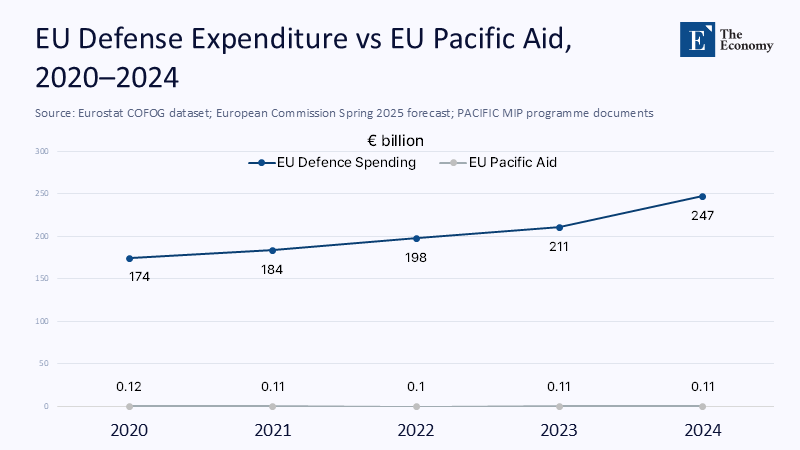
Lessons From Over-Extension and Colonial Hangovers
Europe's record of over-promising in the islands is long. The Lomé sugar quotas of the 1990s evaporated when Balkan peacekeeping devoured the surplus; Cotonou's Pacific investment window plateaued at €65 million and never grew. Pacific ministries remember canceled projects after European Commission reshuffles. Nor do colonial ties justify a renewed plunge. France maintains sovereign territories in Polynesia and New Caledonia, but even Paris hedges its regional posture with just two frigates and a handful of patrol craft. Berlin, Madrid, and Warsaw possess neither diaspora constituencies nor corporate dependencies worth a frigate's fuel bill. Post-Brexit Britain threads its residual interest through AUKUS—an arena from which continental Europe is structurally excluded. Whatever romance European strategists attach to sun-splashed atolls, hard-nosed treasuries view the theatre as a money sink.
Why a Minimalist Strategy Is Still One Strategy Too Many
Some in Brussels argue for a "niche" engagement—satellites, coral genetics, sub-sea-cable redundancy—because expertise, not cash, is Europe's comparative advantage. The proposal sounds prudent, but still misreads priorities. Each euro devoted to Pacific resilience is not spent on shoring up migration hot spots on the EU's periphery or plugging the artillery deficit in Ukraine. Policy is triage. Even a "half-percent slice" of the Global Gateway—€1.5 billion over seven years—would exceed Europe's net aid to Moldova, a country whose collapse would send refugees over EU borders by the hundred thousand. When budgets pinch, proximity trumps romance, and the Pacific is immeasurably far.
Scenarios for 2030: Why Staying Ashore Makes Sense
If Brussels succumbs to the "checkbook chase," it will replicate past fiascos. Matching Chinese loans through a European Investment Bank "Pacific window" might buy headlines, but would almost certainly pile up arrears as tiny island economies struggle to service new debt. German auditors would savage the defaults, populists would weaponize "waste in paradise," and support would evaporate, leaving Beijing the unchallenged lender of last resort anyway. A middle-road minimalist footprint fares a little better. Even €150 million a year in highly targeted climate tech means another line item in strained European Commission negotiations, another item for nationalist parties to decry as charity. At the same time, potholes go unrepaired in Andalusia or Lodz. The sober alternative is acknowledging reality: Europe lacks the incentive and the wallet to contest the Pacific chessboard. Frugality at a distance allows concentration close to home.
Climate Adaptation: Insurance That Still Fails the Cost-Benefit Test
Engagement advocates insist that every euro spent on atoll flood walls ensures Europe against future migration flows and climate blowback. The chain of causation is tenuous. Even the European Environment Agency's worst-case damage estimates price Union-wide climate costs at €387 billion by mid-century—figures driven overwhelmingly by Mediterranean drought and the Rhine–Danube flooding, not Pacific cyclones. Redirecting mitigation cash to Nuku'alofa-Nuku'alofa may win moral points, but it does not fortify Dutch dikes or Greek firebreaks. Europe's border insurance starts in North Africa and the Balkans, not the Coral Sea.
Europe's Strategic Strength Lies in Saying "No"
At the end of the ledger—and this is the only ledger that matters—the Pacific offers Europe negligible trade upside, scant security return, and overwhelming opportunity cost. Attempting to out-gift China in far-flung archipelagos serves neither European taxpayers nor the islanders who will ultimately service Beijing's debt. By declining the lure of symbolic frigate visits and feel-good micro-projects, Brussels can husband resources for existential priorities: deterring Russia, stabilizing North Africa, and absorbing migratory surges. Restraint is not abdication; it is strategy. Sometimes, power is measured not by how many horizons you chase but by how many distractions you resist. In 2025, the wisest course for Europe in the Pacific is the simplest: trim the sails, wave politely, and steer for home.
The original article was authored by Nicholas Ross Smith and Henrietta McNeill-Stowers. The English version, titled "Europe's faltering statecraft in the Pacific," was published by East Asia Forum.



